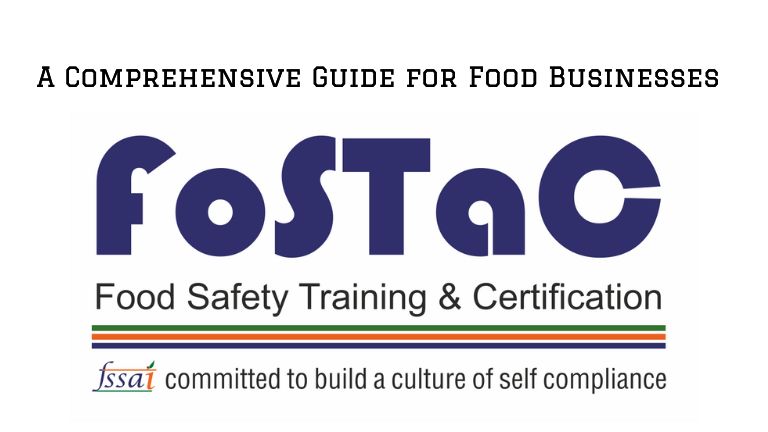The food industry plays a crucial role in public health, making it essential to maintain high safety standards. To ensure food handlers and businesses adhere to proper hygiene and safety measures, the Food Safety and Standards Authority of India (FSSAI) has introduced the Food Safety Training and Certification (FOSTAC) license. This certification aims to create awareness and train food business operators (FBOs) on food safety regulations, reducing the risk of contamination and ensuring consumer safety.
What is a FOSTAC License?
A FOSTAC license is a mandatory certification provided by FSSAI under the Food Safety and Standards Act, 2006. It is designed to educate and train food handlers, supervisors, and food business operators on food safety management systems. The training is structured to instill best practices, covering various aspects such as hygiene, storage, handling, and risk management.
The FOSTAC certification ensures that every food business has at least one trained Food Safety Supervisor (FSS) who can oversee operations and ensure compliance with safety norms.
Importance of a FOSTAC License
Compliance with Regulations: The FOSTAC certification helps businesses comply with food safety laws and avoid legal complications.
Consumer Safety: It ensures that food handlers are well-trained, reducing the risk of contamination and foodborne illnesses.
Reputation and Trust: Certified businesses are seen as trustworthy and responsible, improving customer confidence.
Operational Efficiency: Trained employees handle food better, leading to reduced wastage and increased efficiency.
Market Competitiveness: Many food businesses require suppliers and partners to be FOSTAC certified, making it easier to collaborate.
Who Needs a FOSTAC License?
The FOSTAC license is required by various entities in the food industry, including:
Restaurants and hotels
Food manufacturers and processors
Street vendors and small food businesses
Catering services and cloud kitchens
Food retailers and wholesalers
Packaged food companies
Dairy and meat processing units
FSSAI mandates that at least one trained Food Safety Supervisor should be present for every 25 employees handling food.
Types of FOSTAC Training Programs
FOSTAC training is divided into three levels based on the nature of the business and the responsibilities of food handlers:
Basic Level: Designed for street food vendors, small food businesses, and catering services.
Advanced Level: Suitable for mid-sized food processing units, restaurants, and retail chains.
Specialized Level: Intended for high-risk food sectors such as dairy, meat processing, seafood, and large-scale food production.
Each level covers various modules, including personal hygiene, food handling practices, storage guidelines, and legal compliance.
How to Obtain a FOSTAC License?
Acquiring a FOSTAC license involves the following steps:
Choose the Appropriate Course: Identify the relevant FOSTAC training program based on the nature of your food business.
Register for Training: Apply for training through FSSAI-approved training partners.
Attend the Training Sessions: Complete the training, which includes theoretical and practical knowledge about food safety.
Pass the Assessment: After training, participants must pass an assessment to demonstrate their understanding.
Receive Certification: Upon successful completion, FSSAI issues a FOSTAC certificate, validating the individual’s capability as a Food Safety Supervisor.
Validity and Renewal of FOSTAC License
The FOSTAC certification is valid for two years, after which it needs to be renewed. Businesses must ensure timely renewal to continue compliance with FSSAI regulations. Refresher courses are available to update food handlers on the latest food safety practices.
NOTE- If you have any doubts feel free to contact a reputed consultant of FSSAI REGISTRATION
Penalties for Non-Compliance
Failing to obtain a FOSTAC license can result in legal consequences, including:
Monetary fines
Temporary or permanent closure of the business
Loss of consumer trust
Legal action under the Food Safety and Standards Act, 2006
To avoid such issues, businesses should ensure they obtain and maintain the necessary certifications.
Top 10 FAQs on FOSTAC License
What is the purpose of a FOSTAC license?
The FOSTAC license ensures food businesses follow proper hygiene and safety standards by training their staff in food safety management.
Is a FOSTAC license mandatory for all food businesses?
Yes, as per FSSAI guidelines, every food business must have at least one certified Food Safety Supervisor.
How long does the FOSTAC certification remain valid?
The FOSTAC certification is valid for two years and requires renewal afterward.
Who conducts the FOSTAC training?
The training is conducted by FSSAI-approved training partners across India.
What happens if a food business does not obtain a FOSTAC license?
Non-compliance can result in penalties, fines, and potential closure of the business.
Can individuals apply for FOSTAC certification, or is it only for businesses?
Yes, individuals working in the food industry can apply for FOSTAC certification to enhance their career prospects.
Is the FOSTAC training available online?
Yes, some FSSAI-approved training partners offer online training sessions.
How much does the FOSTAC certification cost?
The cost varies depending on the level of training and the training provider.
Do all employees in a food business need FOSTAC certification?
No, but at least one Food Safety Supervisor must be certified for every 25 food-handling employees.
How can a business renew its FOSTAC certification?
Businesses can renew their certification by enrolling in a refresher course through FSSAI-approved training providers.
Conclusion
A FOSTAC license is an essential certification for any food business looking to maintain high safety standards and comply with regulatory requirements. By training food handlers in proper safety measures, businesses can ensure hygiene, protect consumers, and enhance their credibility in the market. Obtaining this certification is not just a legal requirement but also a commitment to delivering safe and quality food to consumers. If you own or operate a food business, investing in FOSTAC training can help you stay ahead in the industry while prioritizing public health.
ALSO READ POPULAR ARTICLES

